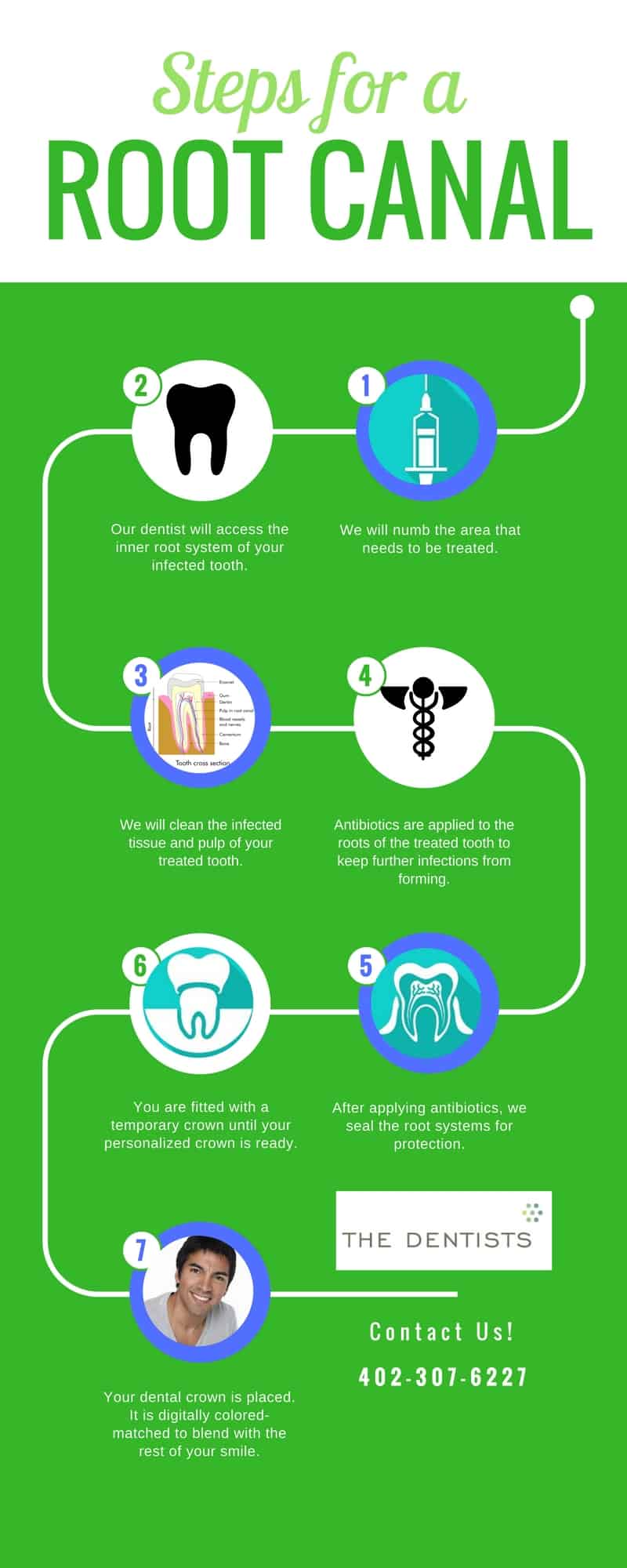General & Cosmetic Dentists Serving Omaha, Bellevue, Lincoln and Nearby Nebraska
When a tooth becomes infected, removing the source of infection is necessary. Infection normally starts from deep decay on a tooth but it can also start in other ways, such as an injury or blow to the tooth or a chip or crack. Root canal treatment removes the infected area and allows the tooth to repair and heal.
Some people become anxious when they learn that they need a root canal. However, there is no reason to be. The treatment is reasonably comfortable, and an infected tooth won’t heal on its own. Without a root canal, the infected tooth will get worse. Pain will increase. Your tooth may eventually be extracted and replaced with a bridge, implant or removable appliance. A root canal saves your natural teeth. It saves money in the long run.
If you have severe pain while chewing or lingering sensitivity to heat and cold, you may have an infection that requires a root canal.
Our dentists can perform scheduled and emergency root canals at any of our four offices in Omaha, Nebraska. Give us a call at Hillsborough: 402-445-4647, Village Pointe: 402-505-7474, Ralston Square: 402-733-4441, or Dundee: 402-502-5593 for friendly and compassionate assistance.
Why Do I Need a Root Canal?
At The Dentists, we understand that some patients have anxiety about root canal treatment, but we want to assure you that it will be comfortable for you. Treatment, in fact, is your most comfortable option because an infected tooth will never heal. The unpleasant consequences of infection only get worse and more painful with time.
Root canal treatment, meanwhile, prevents the need to extract infected teeth.

Extracted teeth require replacement with a bridge, implant or a removable appliance to help with chewing and to prevent neighboring teeth from shifting. So, the root canal procedure not only saves your natural teeth but can be more cost-effective in the long run.
What Happens During Root Canal Treatment?
Root canal, or endodontic, treatment generally takes two appointments and some follow-up appointments.
During the first appointment, we thoroughly numb your mouth and place a rubber dam around the infected tooth to isolate and help keep it dry. To get to the infected area, we make an opening through the top of the tooth down into the pulp chamber. We use tiny instruments called dental files to carefully remove the infected tissue and bacteria. These files also shape the root canals to receive a filling material. Then, we place medication in the root canals to kill any remaining bacteria that caused the infection and place a temporary filling or crown to protect the tooth.
During the second appointment, we remove the temporary filling or crown and clean out the remaining infected tissue. We may need to take X-rays to be sure all the infected pulp is removed. We then fill the root canals with a sealer paste and a filling material to complete the project.
At follow-up appointments, we restore your tooth to full function using any number of techniques including the following:
A permanent restoration is needed to protect and strengthen the tooth. When the time comes, we’ll work together to decide which restorative procedure best suits your needs.
FAQ
Cavities are one of those problems that can become worse the longer they are around. If left untreated, the bacteria from the cavity can start eating away at the root of the tooth itself. This can cause the tooth to die and require extraction. However, you can prevent cavities, as well as the need for root canals, by practicing good oral hygiene.
Brushing your teeth twice a day, flossing once a day, and rinsing with mouthwash are the best ways to prevent cavities. But there are other ways you can prevent cavities.
These methods include the following:
- Wearing a mouthguard
- Scheduling routine dental check-ups
- Eating a nutritious, tooth-friendly diet
- Refraining from consuming hard foods
- Never ignore tooth pain and sensitivity
- Quitting smoking
- Stopping alcohol consumption
A root canal is meant to remove infected pulp, but many people often refrain from getting one due to fear or believing a misconception.
Below is a list of what can potentially occur by not getting a root canal:
- Increased pain
- The formation of abscesses
- Increased chance of an infection spreading
- Tooth loss
- Bone loss around the tooth
- Having difficulty eating
- Your overall health is negatively affected
Regarding the latter, having an oral infection can be the catalyst for all sorts of problems. It can lead to heart-related conditions, diabetes, and pregnancy complications.
Root canals are one of those procedures that have a lot of myths and misconceptions surrounding them. A common misconception about root canals is that they are extremely painful. Due to the modern innovations in dentistry these days, patients who require a root canal feel next to nothing. The discomfort experienced is usually after the root canal is performed.
A root canal usually involves two sessions plus follow-ups. During the first, we numb your mouth and drill from the top of the tooth to the pulp chamber. We remove the infection with dental files, shape the canal to accept a filling, apply medication to kill the remaining bacteria, and install a temporary crown or filling.
At the second appointment, we removed the temporary and cleaned out any remaining infected tissue. We then fill the root canal with sealer paste and the filling material.
We restore tooth function with a white filling or a crown during follow-up appointments.
People with heat- or cold-sensitive teeth, cracked or chipped teeth or swollen, tender gums may need a root canal.
We cannot restore some teeth due to severe damage or bone degeneration. A root canal will not help in these cases.
Practicing good oral hygiene, such as brushing, flossing and rinsing with mouthwash is the best way to prevent a root canal. It is also important to treat cavities promptly and never ignore tooth pain or sensitivity.
Not getting a necessary root canal can result in increased pain, difficulty eating, abscesses, bone loss, a decline in general health and the eventual loss of the tooth.
It’s a myth that root canals are extremely painful. With modern dentistry, they are no worse than any other dental procedure. There can be mild discomfort for a few days.
A small percentage of root canals fail. Sometimes, the damage is too deep, the enamel too frail, or not all infection is removed. This may result in the loss of the tooth.
It depends on which tooth is affected and the complexity of the problem. Most dental insurance covers some of the cost. It’s less expensive than an extraction and replacement.
After the root canal procedure, it is possible to feel numb for two to four hours. Most people can return to their regular activities immediately, so there is no need for downtime.
Contact The Dentists Today
If you believe you are in need of root canal treatment, contact The Dentists at Hillsborough: 402-445-4647, Village Pointe: 402-505-7474, Ralston Square: 402-733-4441, or Dundee: 402-502-5593 or online to schedule your appointment. We have multiple offices in Omaha serving patients in Bellevue, Lincoln and nearby areas of Nebraska.
